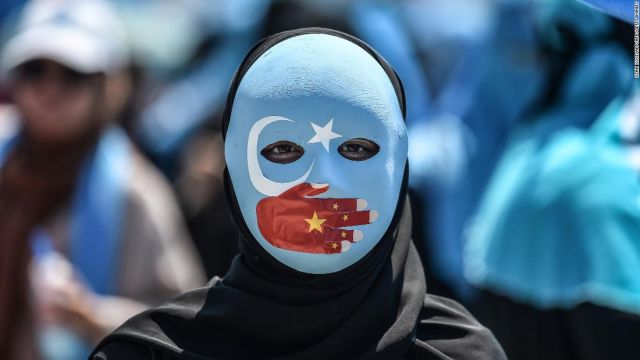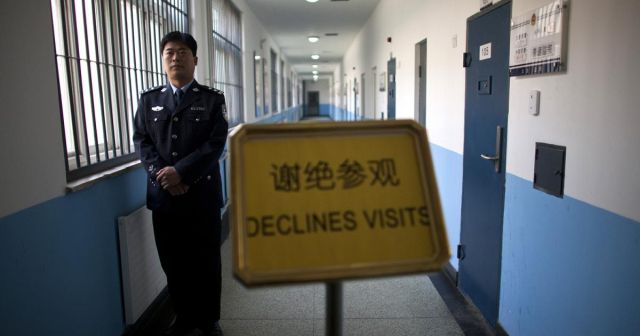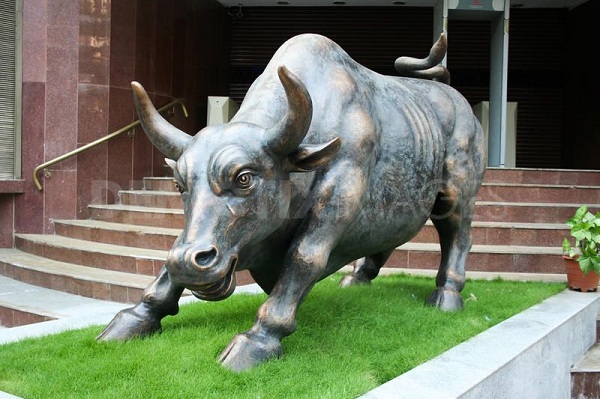
by admin | May 25, 2021 | World

A demonstrator wearing a mask painted with the colors of the flag of East Turkestan and the Chinese flag attends a protest in Istanbul, Turkey in July 2018. Beijing has been accused of widespread human rights violations against Turkic Muslims in the far western region of Xinjiang. (Credit: CNN)
Beijing : A rights group on Monday accused the Chinese government of conducting a mass, systematic campaign of human rights violations against Muslims in the far western region of Xinjiang.
The new Human Rights Watch (HRW) report comes after a UN committee last month raised alarm at the “numerous reports of detention of large numbers of ethnic Uyghurs and other Muslim minorities held incommunicado and often for long periods, without being charged or tried, under the pretext of countering terrorism and religious extremism”, CNN reported.
In the report, HRW documents the increasing government control over the 13 million Muslims living in Xinjiang.
It is estimated that in the area, one million are currently detained in re-education camps where they are forced to learn Mandarin and sing the praises of the Chinese Communist Party.
“The Chinese government is committing human rights abuses in Xinjiang on a scale unseen in the country in decades,” Efe news quoted said Sophie Richardson, HRW China director, as saying.
Detainees in these political re-education camps have not been charged with any crime, have no access to lawyers or contact with relatives.
HRW pointed out that they have been held under circumstances that do not constitute a crime, including having links with foreign countries, using foreign communications tools like WhatsApp – censored by the Chinese authorities – or peacefully expressing their identity and religion.
“I asked (the authorities) if I can hire a lawyer and they said, ‘No, you shouldn’t need a lawyer because you’re not convicted. There’s no need to defend you against anything. You’re in a political education camp – all you have to do is just study’,” a man who spent months in the camps told HRW.
“Nobody can move because they watch you through the video cameras, and after a while a voice came from the speakers telling you that now you can relax for a few minutes… We were watched, even in the toilet,” another detainee told the rights group.
Outside these centres, Xinjiang citizens are under mass surveillance with high-tech systems such as phone spyware, biometrics, QR codes and big data, and officials make regular visits to their homes where they stay, the report said.
Passport controls, compulsory attendance in Mandarin night schools or flag-raising ceremonies are also common, with authorities even encouraging neighbours to spy on each other and sowing division between families.
Amid the allegations of systematic abuse by numerous organisations in Xinjiang, the Chinese government insisted that people in China have complete freedom to choose their religion.
—IANS

by admin | May 25, 2021 | World
 Beijing : A rights group on Monday asked the Chinese government to stop building big data policing platforms to store personal information of its population, calling it a violation of privacy rights.
Beijing : A rights group on Monday asked the Chinese government to stop building big data policing platforms to store personal information of its population, calling it a violation of privacy rights.
The Human Rights Watch’s statement said the “Police Cloud” was designed to track and predict the activities of activists, dissidents and ethnic minorities, and does not comply with international privacy standards, reports Efe news.
“It is frightening that Chinese authorities are collecting and centralizing ever more information about hundreds of millions of ordinary people, identifying persons who deviate from what they determine to be ‘normal thought,’ and then surveilling them,” said Sophie Richardson, China director at Human Rights Watch.
The Chinese government, according to the HRW, has stored citizens’ information for years, and is now exploring new technologies to gather personal information more efficiently, and to share it across departments at both the national and local levels.
Various applications used to analyse texts, videos and security camera images in real time or near real time are aimed at suppressing crimes, however, the HRW said these methods also allow police to arbitrarily obtain information about ordinary people.
International privacy standards require the collection, retention, and use of the personal data of individuals for policing purposes be allowed only if there was a genuine threat to a public interest; the laws in China did not meet these requirements, said the HRW.
“Preventing crime is a legitimate state interest, but predictive tools often point to the same old patterns, making it likely for policing to replicate old mistakes or biases such as targeting of people of lower socio-economic status.
“This throws into doubt whether the use of these predictive tools adds much new, and whether they are either a necessary or proportionate intrusion on the rights of individuals,” the HRW added.
—IANS

by admin | May 25, 2021 | Opinions
 By Rohit Vaid
By Rohit Vaid
Mumbai:(IANS) A global relief rally fuelled by hopes of a Chinese government’s stimulus, coupled with hopes of a better monsoon performance, a strengthening rupee and push for domestic reforms buoyed Indian equity markets to gain around two percent during the week just-concluded.
The barometer 30-scrip sensitive index (Sensex) of the S&P Bombay Stock Exchange (BSE) gained by 408.31 points or 1.62 percent in the weekly trade ended September 11.
The Sensex ended the week at 25,610.21 points from its 25,201.90 points closing on September 4.
The wider 50-scrip Nifty of the National Stock Exchange (NSE) rose by 134.25 points or 1.72 percent at 7,789.30 points.
Analysts cited that a global rally sponsored by the Chinese government’s reforms and expected stimulus, in addition to positive cues from the US and European markets, restored investor confidence.
“In absence of any major domestic trigger, markets continued to look towards global cues. The benchmarks traded in a narrow range this week led by cautiousness ahead of the US interest rate hike,” Vaibhav Agrawal, vice president, research, Angel Broking elaborated to IANS.
“The comments from the Chinese Premier helped sooth nerves.”
The Chinese government boosted investor confidence the world over by initiating a string of reforms aimed at curbing stock market volatility and encouraging long-term investments.
There were also expectations of a new stimulus package in China.
“The Chinese are implementing reforms that will encourage long term investments in stock markets by waving taxes and installing a circuit breaker systems to curb volatility in the stock markets,” Anand James, co-head, technical research desk with Geojit BNP Paribas Financial Services told IANS.
“The reforms and expectations of a stimulus started the global relief rally, which was supported by the US markets. However, with the fast approaching date for the US rate hike decision fizzled out the rally.”
Interestingly, the continuous slide in the Chinese markets had spooked global investors and dampened Indian equities on fear of another recession – caused by the slowdown – in the $10 trillion economy.
The massive implosion in the Chinese markets, by some estimates, has eroded 40-45 percent of its entire stock value. This, coupled with the devaluation of the yuan and lower factory output, signals an impending slowdown.
Market observers elaborated that the Indian rally was also supported by the recent cabinet’s decisions, the prime minister’s message to increase industry’s investments, the upcoming Seventh Pay Commission and cooling oil prices.
“Sentiment was boosted by the prime minister’s meeting with India Inc, key decisions taken by the cabinet and lower-level buying and short covering helping the indices register gains,” said Gaurav Jain, director with Hem Securities.
“Key decisions taken by the cabinet to boost the economy like spectrum trading norms, gold monetisation schemes, improving commodity prices and short-covering boosted sentiments,” Jain elaborated to IANS.
Prime Minister Narendra Modi held a high level consultative meeting on ‘Recent Global Events: Opportunities for India’ here on September 8.
On September 9, the cabinet also gave positive signs on the reforms front, especially on the passage of the goods and services tax (GST) bill.
The cabinet’s approval of spectrum trading, gold bonds and hike in dearness allowance for centrral government employees and pensioners buoyed Indian equity markets
Furthermore, the Bank of England’s decision to continue with its “easy monetary policy” and the clarification by the Met department that it had not lowered its long-period average rainfall projections supported the markets.
Furthermore, the rupee recovered from its two-year low of 66.86 against the greenback on September 7. It closed the week at 66.54 to a US dollar.
However, going forward, the currency and equities markets can be pulled down as investors became anxious about the heightened chances of the US Fed opting for an interest rate hike after a decade or so of an easy monetary regime.
“Volatility will persist until the Federal Open Market Committee (FOMC) decision becomes clear. More important is the language that the Fed is going to use. A dovish one will support a recovery in rupee and equities. This could be a sustaining recovery,” Anindya Banerjee, associate vice president for currency derivatives with Kotak Securities, told IANS.
“The recovery can be as strong as taking rupee to 64-levels. However, a hawkish outlook will heighten the chances of a rate hike in December.”
The US Fed will decided on whether or not to raise interest rates at the FOMC meeting slated for September 16-17.
High interest rates in the US are expected to lead away the foreign portfolio investors (FPIs) from emerging markets like India. It is also expected to dent business margins as access to capital from the US will become expensive.
It is estimated that the foreign funds and investors have sold around $3 billion since August.
(Rohit Vaid can be contacted at rohit.v@ians.in)




